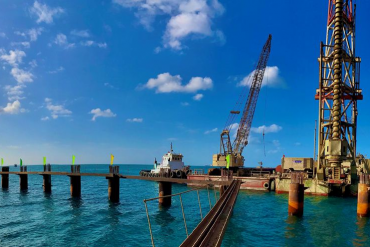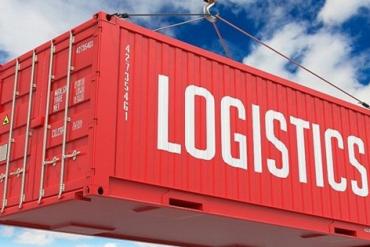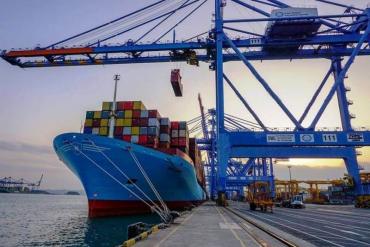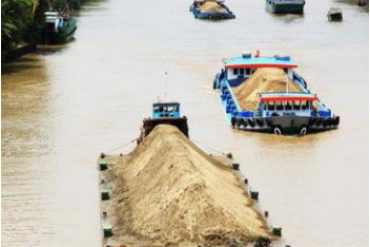- MAKING THANH HOA A LOGISTICS CENTER OF THE NORTHERN CENTRAL (25/05/2021)
- VIETNAM LOGISTICS SERVICE INDUSTRY IS EXPECTED TO GROW BY 15% - 20% BY 2025 (12/03/2021)
- IMPORTERS FACE TOUGHEST TRANS - PACIFIC SERVICE CONTRACT TALKS IN YEARS (01/03/2021)
- VIETNAM INCREASED 3 STEPS IN LOGISTICS 2021 INDEX RANKINGS (26/02/2021)
- Logistics News - February 2021 (23/02/2021)
- Logistics with agricultural trade (12/09/2020)
- Key Trends Impacting Logistics in 2020 (07/09/2020)

An insider's guide to freight forwarding
Eytan Buchman from Freightos shares useful tips and insights
“Find a freight forwarder that makes tracking progress easy” is one of the top tips Freightos Chief Marketing Officer, Eytan Buchman, shared with us in a recent one on one interview.
Buchman answered ten questions regarding the process of freight forwarding and the role technology has played in the field. He also shared his tips for making better decisions when it comes to choosing the right freight forwarder.
What is freight forwarding?
Freight forwarding is the process of moving freight from one place to another, either domestically or internationally, using carriers for sea, air, and/or inland transport. This frequently also includes other aspects of the import or export process, like customs clearance, packaging, storage, reverse logistics, quality assurance and more.
For most individuals and businesses, managing the logistics of cargo shipping is a big hassle – and sometimes even impossible to do alone. A freight forwarding company is like a travel agent that connects shippers with the carriers and other providers they need to transport their goods.
Freight forwarders do not actually transport freight themselves, but instead manage the process of getting the goods where they need to go. It’s helpful to think of them as a travel agent for freight, stitching together all the parts of the journey and then making sure it actually happens during the process.
Could you explain how freight forwarding works?
When you work with a freight forwarder, they manage the transport of your goods according to the terms you select with them. That is, you might contract them to take charge of moving your goods all the way from the factory overseas to the warehouse in your town, or you might agree that their service will begin at the origin port (if you’ve ever heard someone say “ship it FOB”, that’s what they mean), or end at the destination port. Once these terms are agreed upon, the forwarder will take care of all transport for that length of your freight’s journey.
What is a freight forwarder? If you had to define it in just a short sentence, what would it be?
A freight forwarder is like a travel agent that connects international shippers to providers that transport their goods, ensure compliance with local regulations and that the goods get where they need to go, safely and in a cost-effective manner.
Why should someone use a freight forwarder?
Using a forwarder is the right choice for most shippers. That’s because forwarders have the resources and experience to connect shippers with the providers they need, and to deal with the often burdensome details such as factory licensing, securing spots on carriers, and working with local trucking companies. Using a forwarder also provides importers and exporters with an address to turn to for help if something goes wrong. Furthermore, the international airlines or ocean carriers typically do not work directly with small or midsized companies.
As a matter of fact, we believe in freight forwarders so much that we built an entire platform – Freightos.com – as a platform to connect freight forwarders with small and midsize businesses (and it’s used by over 150,000 companies).
Can you share with us some tips on how to find a good freight forwarder?
- First, get recommendations. Talk to other shippers you know, and look for recommendations online on sites like Trustpilot, Reddit, or other forums for importers and exporters.
- Choose a forwarder that works with your needs. For example, if you’re an FBA shipper, or shipping goods with special requirements, make sure your forwarder is able to handle it.
- Check their tracking options: are they available online, or do you have to make a phone call every time you want to check on your shipment status? Look for forwarders that make tracking progress easy.
- Compare their prices to those of other forwarders and make sure they’re competitive. But, make sure to compare equivalent levels of service. Otherwise, you might find that one price is far cheaper than another – but only gets your goods to the port, not all the way to your warehouse.
- Use Freightos.com, of course, which manages live pricing, booking, and shipment management across dozens of the world’s top providers.
What is the difference between freight forwarding and clearing?
A freight forwarder is responsible for moving freight from the origin to the destination. A clearing agent is responsible for arranging customs clearance.
What is the role of technology in freight forwarding?
Freight forwarding is a complex and fast-paced industry, juggling multiple stakeholders (carriers, shippers, warehouses, customs, last-mile delivery etc.) across multiple geographies, languages, standards and requirements, and including thousands and thousands of possible combinations of providers and lanes across multiple possible modes of shipping (ocean, air, rail, road).
To date much of this work has been done by phone, email and Excel sheet. It is error prone and takes a long time to get information to customers. So shippers may suffer from lack of efficiencies not only in the form of slow or poor service, but also in price opacity (as it is an arduous task to get rates from one let alone multiple provider) and poor visibility of the shipment itself (where is my freight and when will it arrive?).
Digitization efforts therefore focus on simplifying tasks and automating processes whenever possible both to make the freight forwarder’s job less complex and easier to manage, and to improve the customer experience of shipping freight.
Which are or will be the leading technology advancements that logistics pros should not ignore?
A central aspect of freight forwarding is locating and pricing the best shipping options for each RFQ. Forwarders have to pull this information from a complex and regularly updated database of routes, carriers and rates, which generally exist in the form of Excel sheets.
- Rate management solutions, or the digitization of the rate retrieval process, is therefore one of the key advancements taking hold in the industry. The ability to search and view all the relevant options for a specific shipping request is a big leap forward in terms of speed and accuracy.
- eBooking – Rate management also enables another advancement in freight tech, which is mostly taken for granted in other industries – self-service, which in freight would be the ability of shippers themselves to search and book (or at least retrieve an instant quote for) freight shipments through a freight forwarder or carrier.
- Track and Trace – The other major pain point that technology is working to remove is shipment tracking – integrating multiple data points collected across the shipping process to provide shippers with real-time updates of their shipment status and accurate ETAs.
How far has the industry come in its digitalisation journey?
The industry has made real progress in digitization over the past few years as digital solutions have been developed to ease the main pain points. As surveyed in the Freightos Groups’ latest State of Digital Freight study, nearly all the major carriers and forwarders now have a functional website/digital portal offering varying degrees of relevant information and digital services and new ‘digital forwarders’ such as Flexport have also come on the scene.
But even among the largest forwarders, none of the above basics have become the norm, and customer experience remains at a different standard than in many other B2B settings.
At some point in the coming years – as the ‘digitally native’ generation with their expectations for service comes of age, as more companies start adopting these technologies, and then even more companies follow suit in order to keep up – these advances will become standard. Competition will then likely shift to how these tools are leveraged to deliver the best customer experience.
But the industry is not there yet: for example, nearly no forwarders provide eBooking, very few provide instant freight quotes, most do not even respond to online requests for freight quotes, and those that do often take days to do so.
Extracted from: MarineTrafficBlog
Author: Sotiria Kontoupolou
Tag :




















